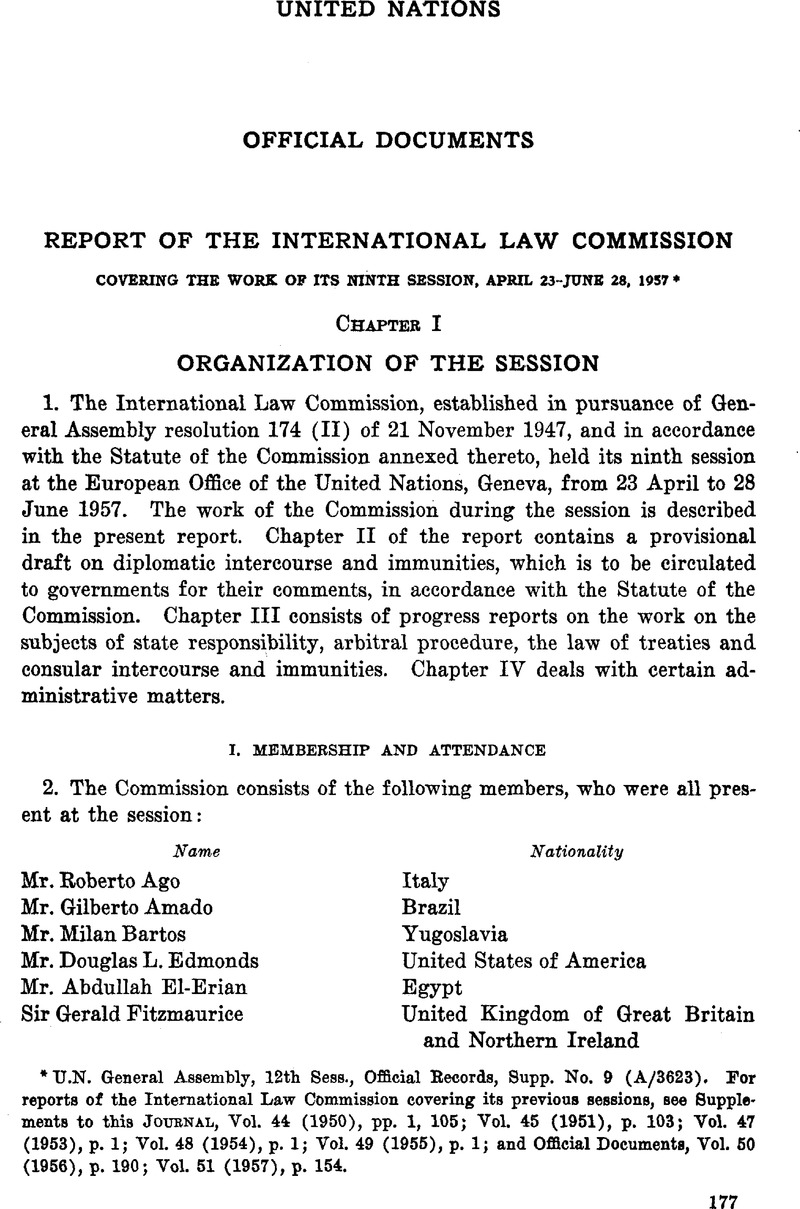No CrossRef data available.
Article contents
United Nations: Report of the International Law Commission
Published online by Cambridge University Press: 28 March 2017
Abstract

- Type
- Official Documents
- Information
- Copyright
- Copyright © American Society of International Law 1958
References
* U.N. General Assembly, 12th Sess., Official Becords, Supp. No. 9 (A/3623). For reports of the International Law Commission covering its previous sessions, see Supplements to this JOTONAL, Vol. 44 (1950), pp. 1, 105; Vol. 45 (1951), p. 103; Vol. 47 (1953), p. 1; Vol. 48 (1954), p. 1; Vol. 49 (1955), p. 1; and Official Documents, Vol. 50 (1956), p. 190; Vol. 51 (1957), p. 154.
1 Official Records of the General Assembly, 4th Sess., Supp. No. 10 (A/925), pars. 16 and 20.
2 Ibid., 8th Sess., Supp. No. 9 (A/2456), par. 170.
3 Ibid., 9th Sess., Supp. No. 9 (A/2693), par. 73.
4 Ibid., 10th Sess., Supp. No. 9 (A/2934), pars. 8 and 9.
5 Ibid., 11th Sess., Supp. No. 9 (A/3159), pars. 5 and 6.
6 The text of the Regulation of Vienna on the classification of diplomatic agents is as follows.: “ In order to avoid the difficulties which have often arisen and which might occur again by reason of claims to precedence between various diplomatic agents, the Plenipotentiaries of the Powers which have signed the Treaty of Paris have agreed to the following articles and feel it their duty to invite the representatives of other crowned heads to adopt the same regulations. “Article 1.—Diplomatic officials shall be divided into three classes: that of ambassadors, legates or nuncios; that of envoys, whether styled ministers or otherwise,accredited to sovereigns; that of chargés d'affaires accredited to Ministers of Foreign Affairs. “Article 2.—Only ambassadors, legates or nuncios shall possess the representative character. “Article 3.—Diplomatic officials on extraordinary missions shall not by this fact be entitled to any superiority of rank. “Article 4.—Diplomatic officials shall rank in each class according to the date on which their arrival was officially notified. “The present regulation shall not in any way modify the position of the Papal representatives. “Article 5.—A uniform method shall be established in each State for the reception of diplomatic officials of each class. “Article 6.—Ties of relationship or family alliances between Courts shall not confer any rank on their diplomatic officials. The same shall be the case with political alliances. “Article 7.—In acts or treaties between several Powers which admit the alternat, the order in which the ministers shall sign shall be decided by lot. “The present Regulation was inserted in the Protocol concluded by the plenipotentiaries of the eight Powers which have signed the Treaty of Paris at their meeting on 19 March 1815.” (The Regulation was signed by the following countries: Austria, Spain, France, Great Britain, Portugal, Prussia, Russia and Sweden. Translation taken from the report of a sub-committee of the League of Nations Committee of Experts for the Progressive Codification of International Law, C.203.M.77.1927.V, p. 2.)
7 The text of the Protocol signed at Aix-la-Chapelle on 21 November 1818 by the plenipotentiaries of Austria, Great Britain, Prussia, Russia and France, is as follows: “ I n order to avoid the possibility of unpleasant disputes with regard to a point of diplomatic etiquette for which the Annex to the Decision of Vienna, regulating the question of rank, seems to have made no provision, it is decided, as between the five Courts, that the ministers resident accredited to them shall take rank as an intermediate class between ministers of the second class and chargés d'affaires.” (Translation taken from the report of a sub-committee of the League of Nations Committee of Experts for the Progressive Codification of International Law, C.203. M.77.1927.V, p. 2.)
8 Article 8 of the 1929 draft of the Institute of International Law on diplomatic immunities. Annuaire de l'Institut de Droit International, 1929, Vol. II, p. 307.
9 Official Records of the General Assembly, 11th Sess., Supp. No. 9 (A/3159), par. 47.
10 Report of the International Law Commission covering Its First Session, Official Records of the General Assembly, 4th Sess., Supp. No. 10 (A/925).
11 Ibid., 8th Sess., Supp. No. 9 (A/2456).




